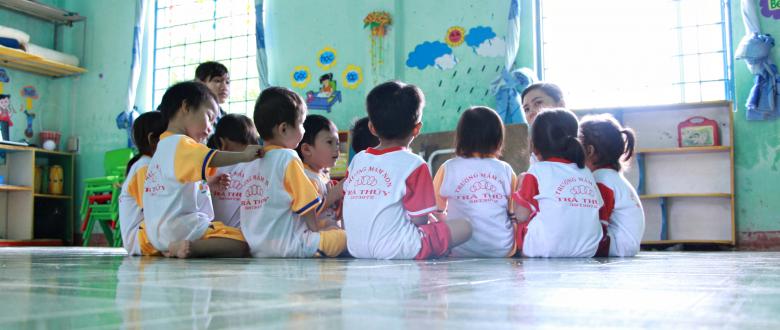
Teaching together
In most preschools in Vietnam, two teachers teach the same class at the same time. This is the result of a regulationintroduced in 2015 that states that every preschool classroom can have two teachers. These preschool teachers take up an equal role in the classroom. Their roles vary depending on the activities. The teachers prepare the lessons together and discuss who will do what. The school leader of the Lich Son school explains how he supports his co-teachers:
“Mss. Trang and Thuy, both preschool teachers, are professionally well developed, but their co-teachers are still new. While the other teachers received a training on process-oriented child monitoring, they didn’t. As they don’t understand it yet, they cannot support Mss. Trang and Thuy actively. We have asked Mss. Thuy and Trang to share their experiences with child observation with their co-teachers, so they can support each other better.”
What are the advantages of co-teaching in preschools in Vietnam?
- The teachers reflect and prepare lessons together.
- Four eyes see more than two: they jointly observe children’s wellbeing and involvement.
- Opportunity to support changes in environment and introduce innovation in the classroom.
- There is more room for division of tasks and differentiation.
- This has a positive effect on the learning of children.
Ha, preschool teacher of the Quang Trung school, reflects on the advantages of teaching together:
“I sometimes find it difficult to come up with new and innovative ideas for class activities or methods. I’ll do mybest. Usually my colleague, who is the second teacher in the class, and me discuss this. When necessary, we ask support from the school leaders.”
But there are also challenges to implement co-teaching effectively:
- In practice, teacher assistants literally ‘activate’ more passive and less involved children.
- Teacher-centered practices are predominantly observed.
- Teachers are not used to systematic reflection or collaborative learning, which is necessary to fully benefit from the co-teaching policy.
- There is no training on co-teaching in the teacher training curriculum.
- In more remote areas, there is a shortage of human resources.
What can Flanders (Belgium) learn from Vietnam to strengthen its practice of co-teaching?
- A legal framework provides guidance and encourages the implementation of co-teaching.
- The school leader has an important supportive role.
- Sharing is caring.
- Co-teaching promotes systematic reflection and collaborative learning.
- A good preparation for co-teaching in teacher training is necessary.




